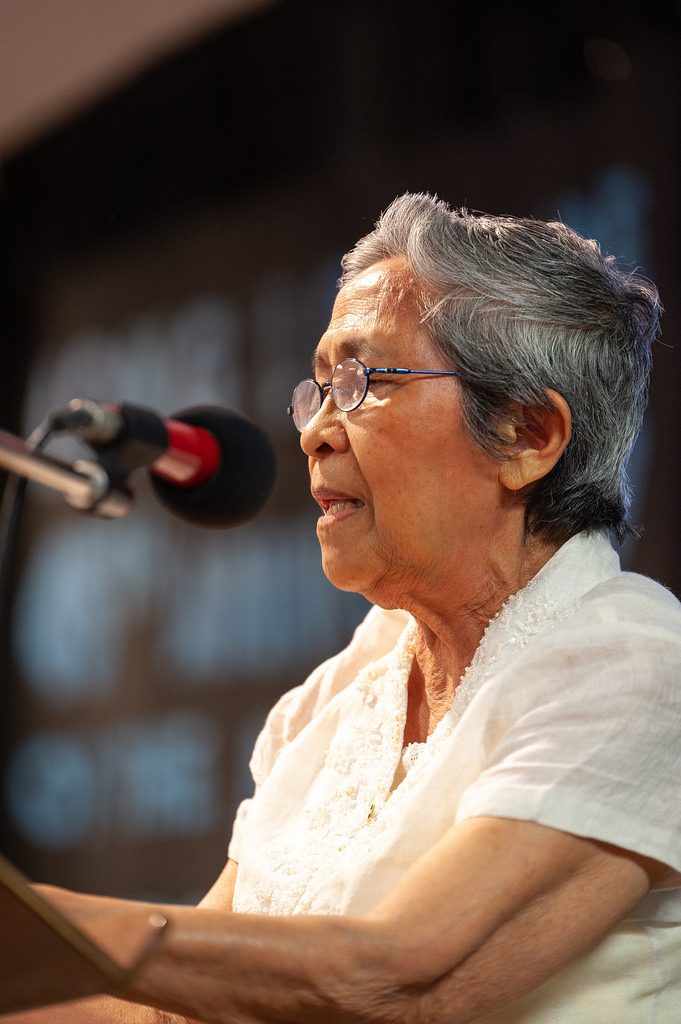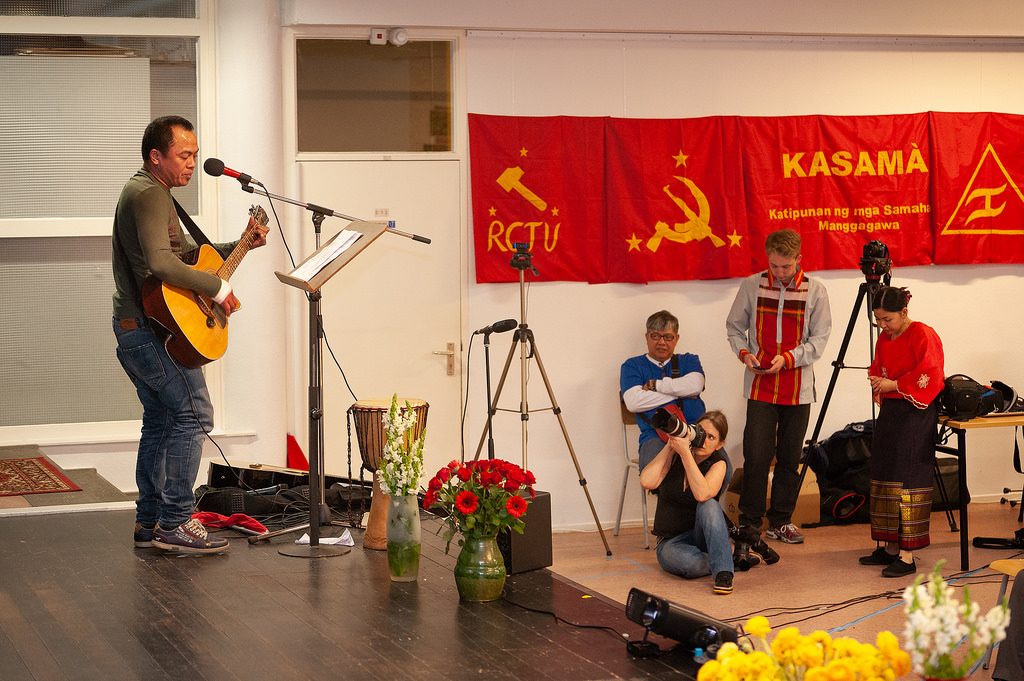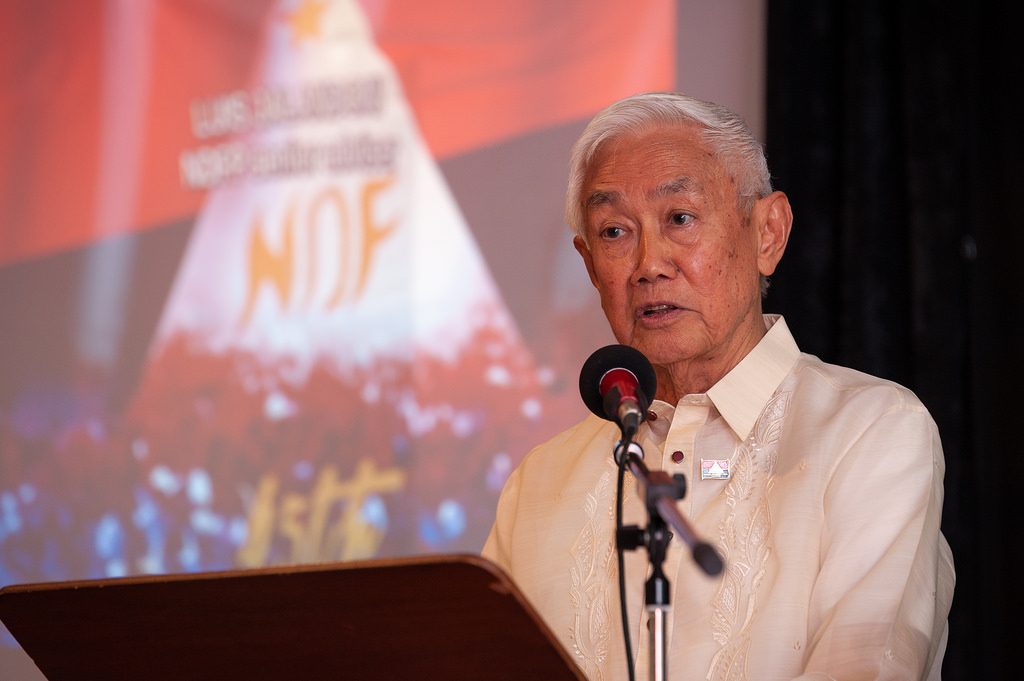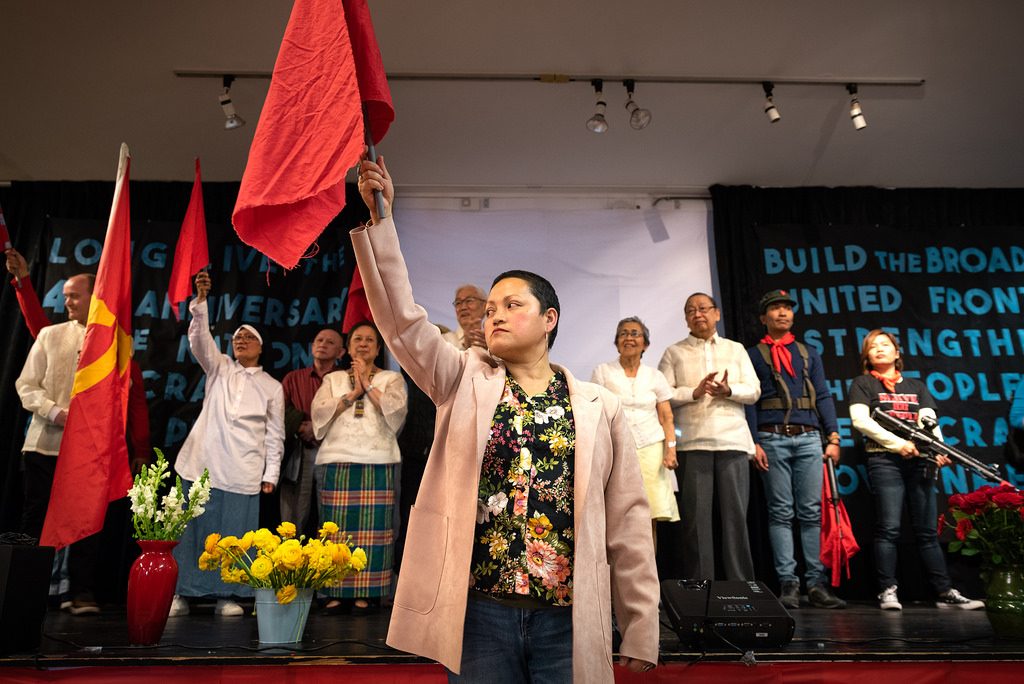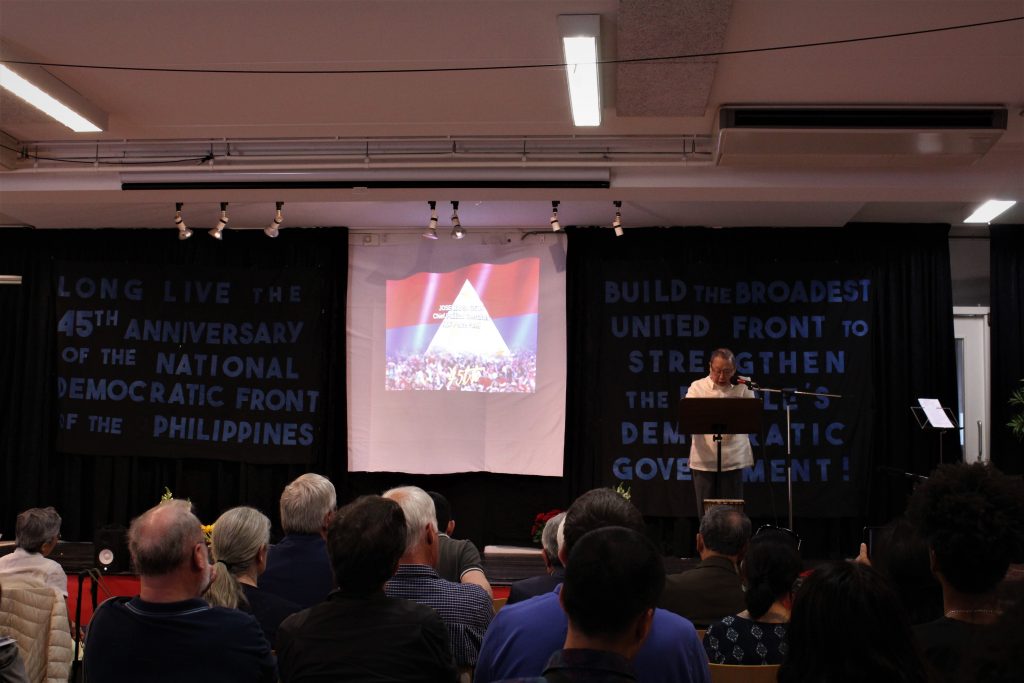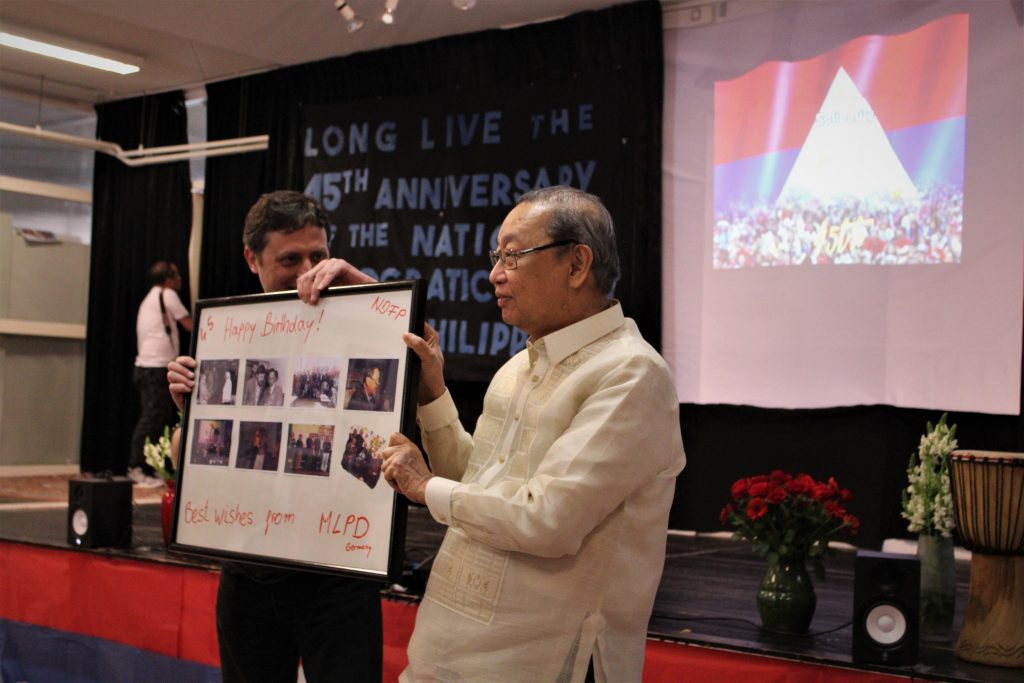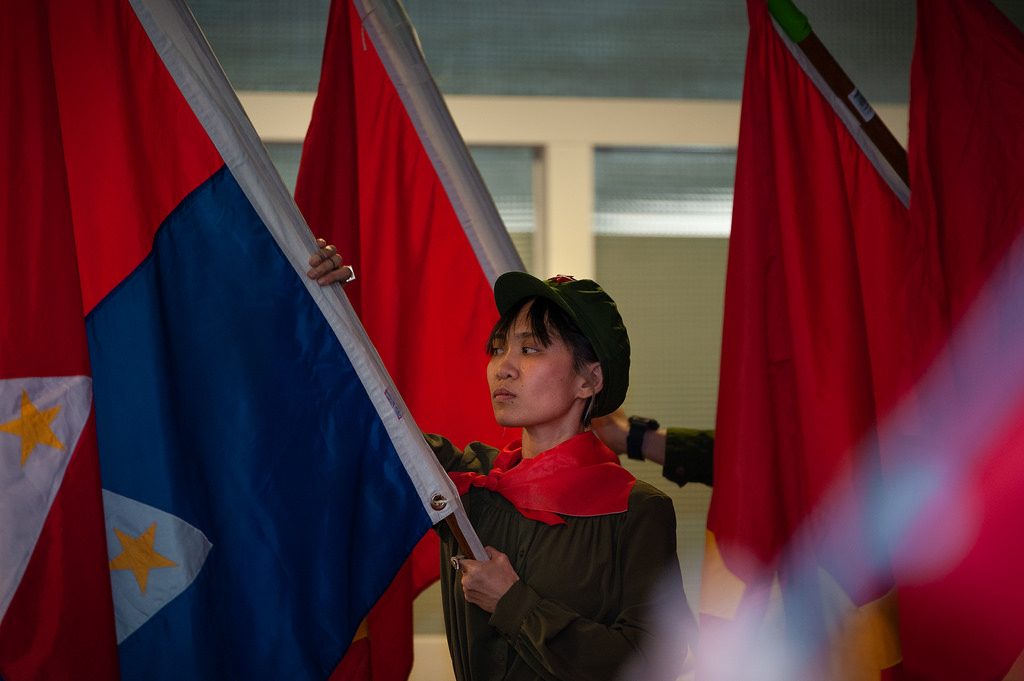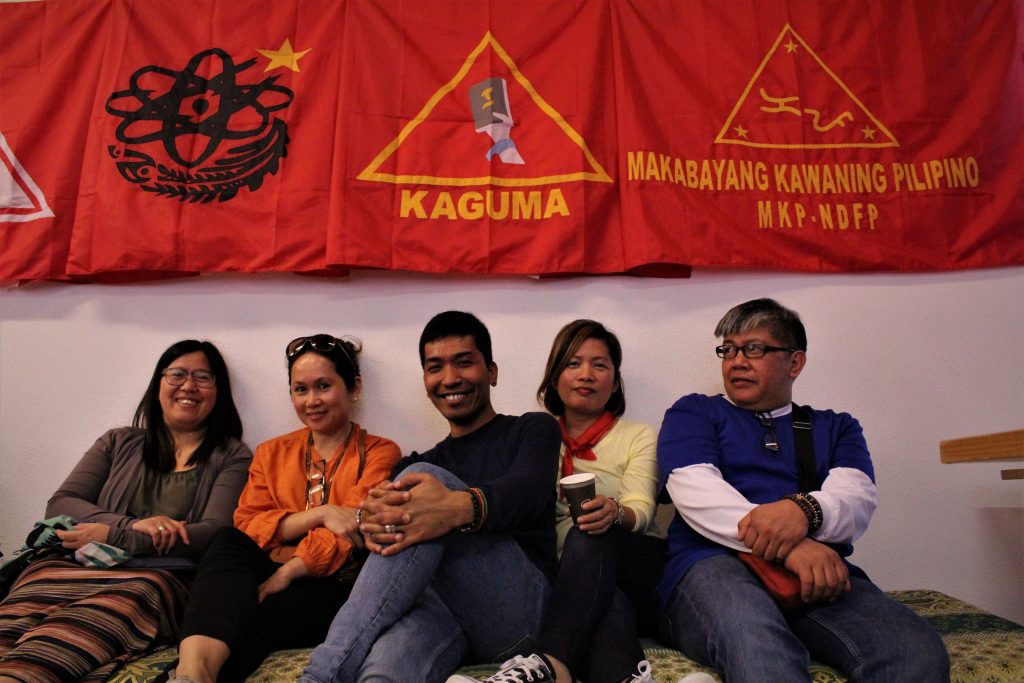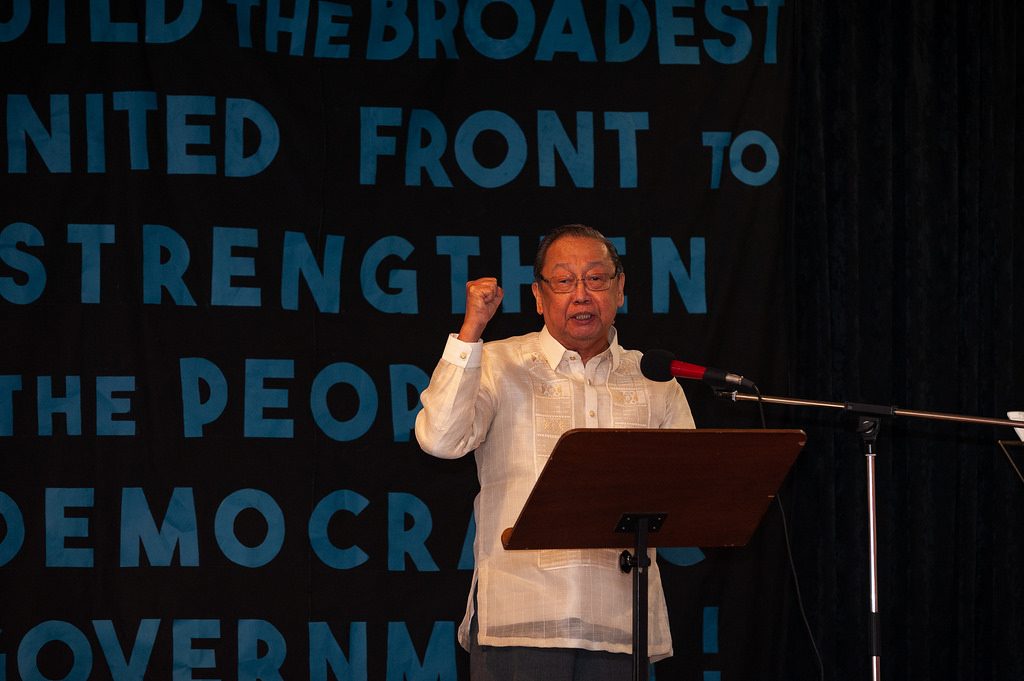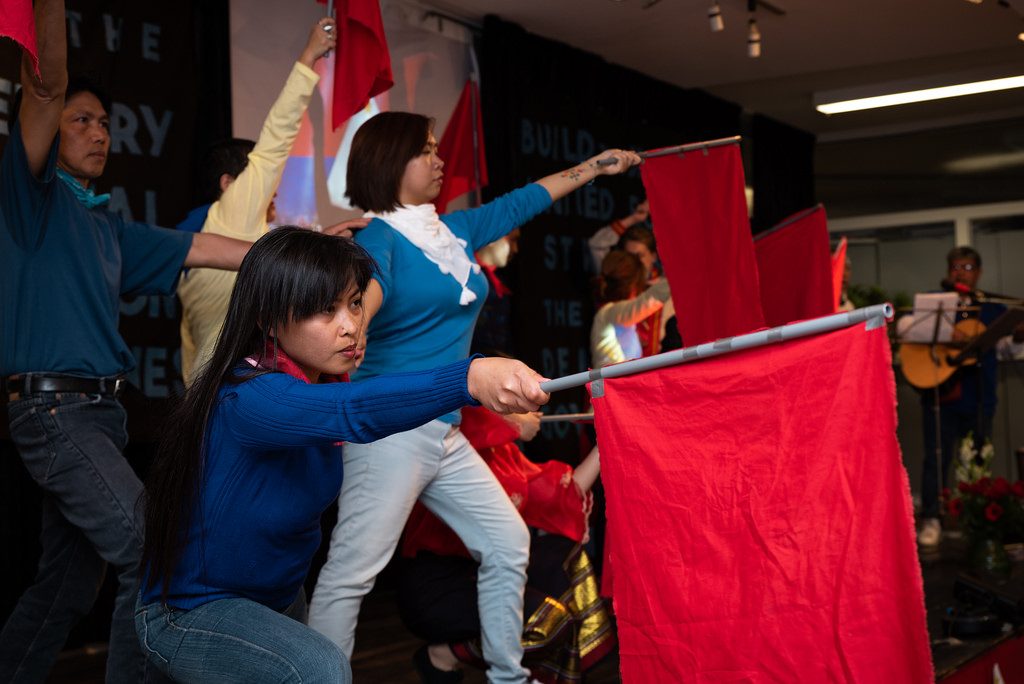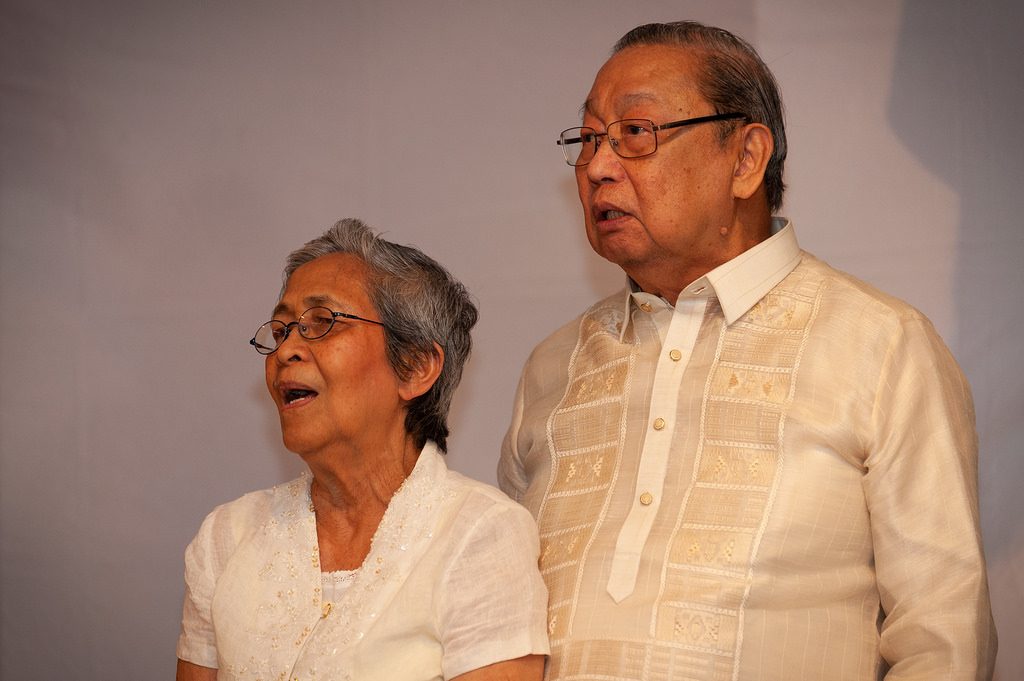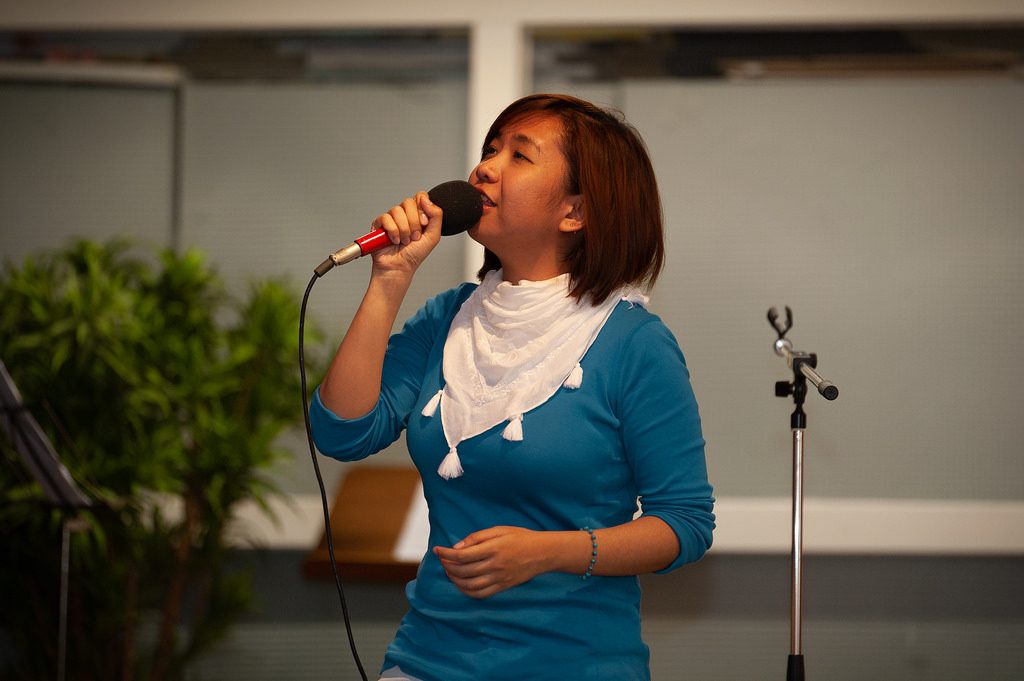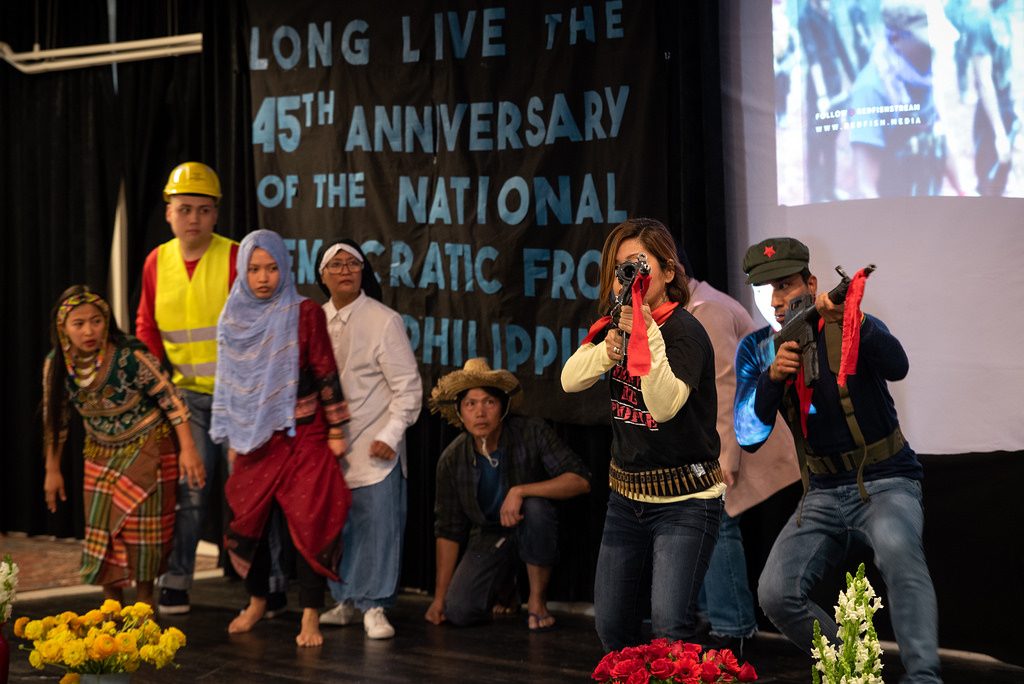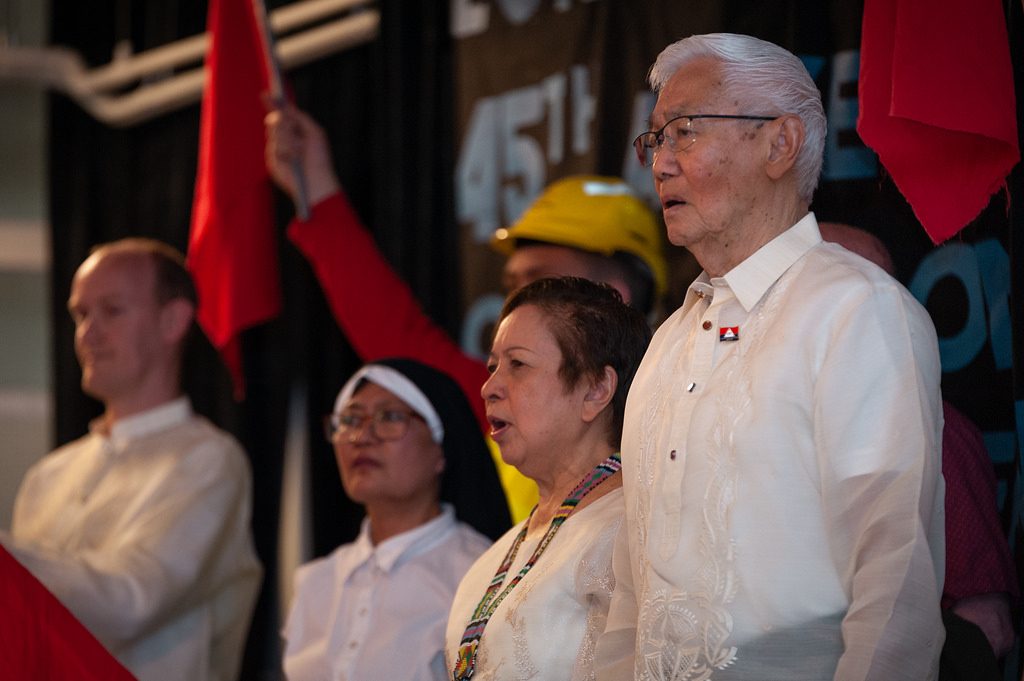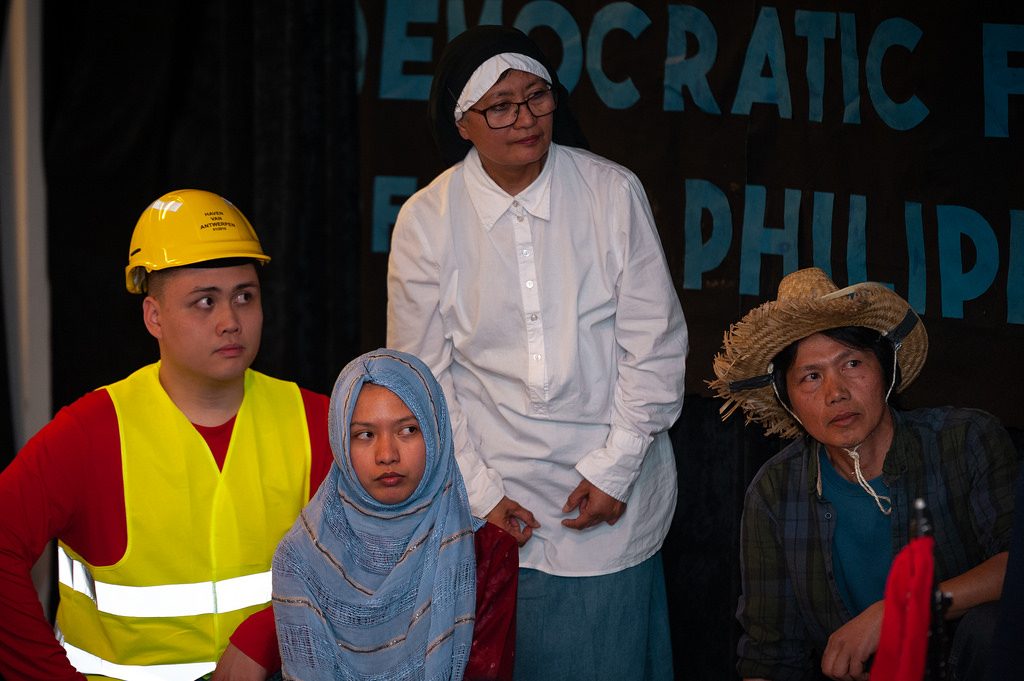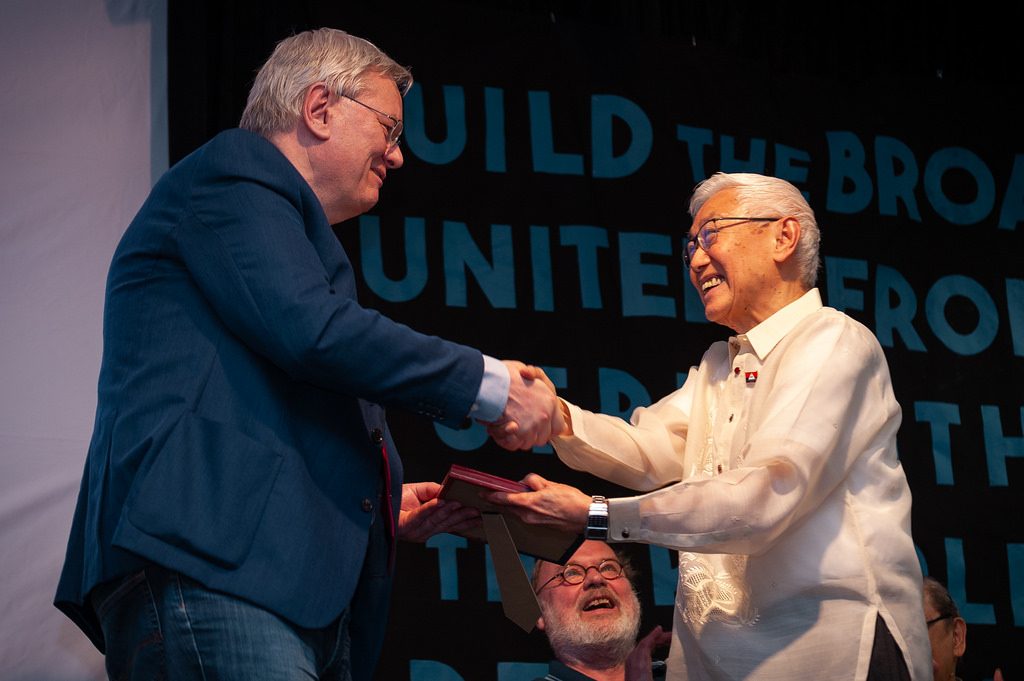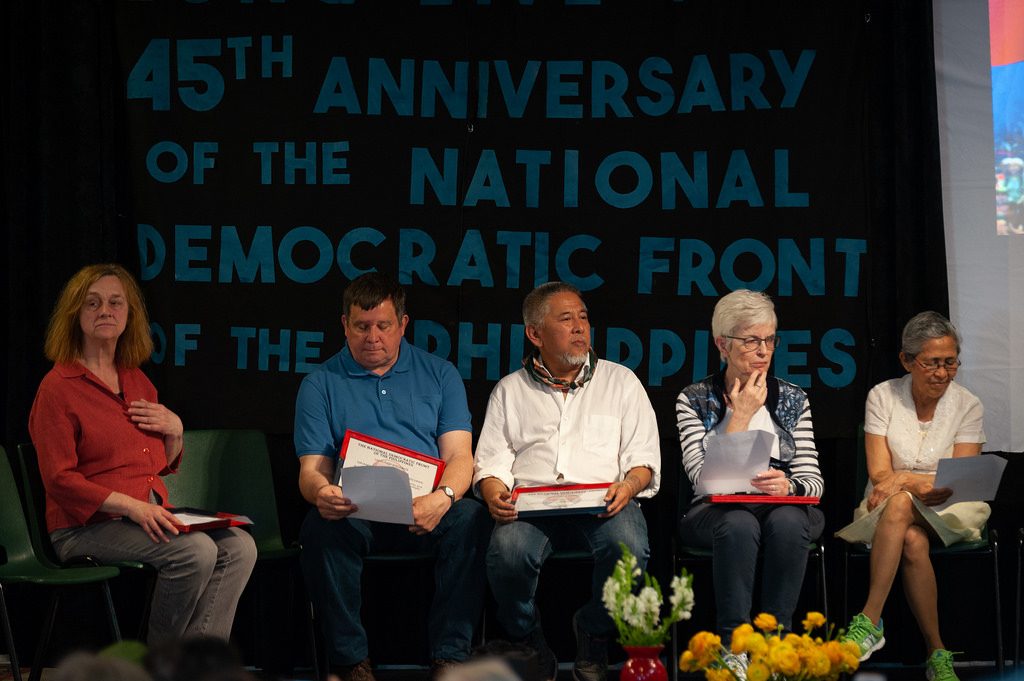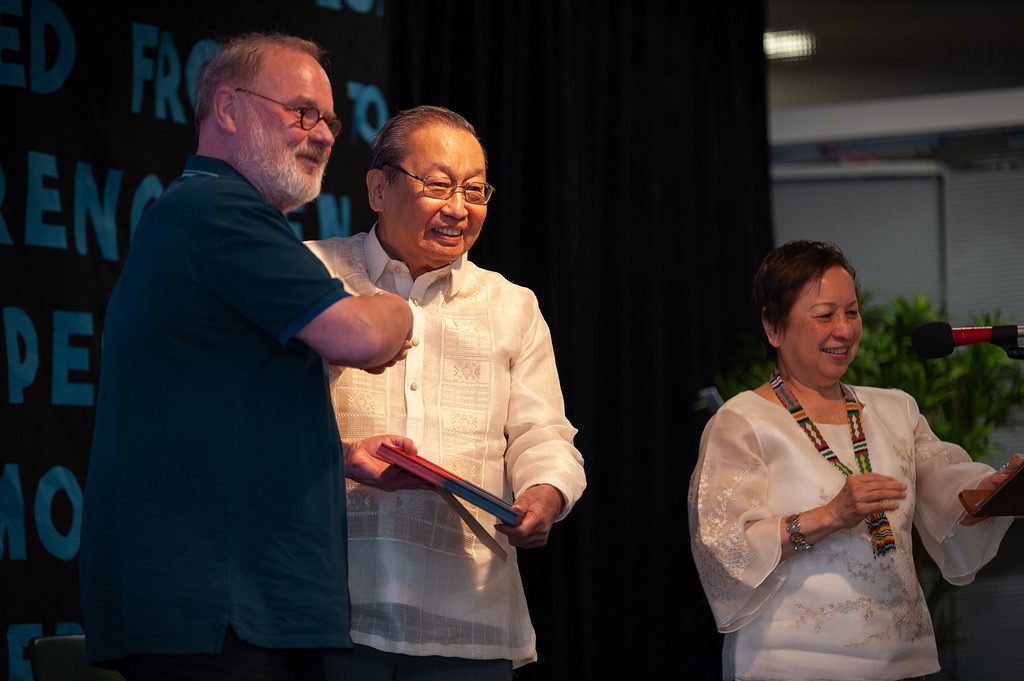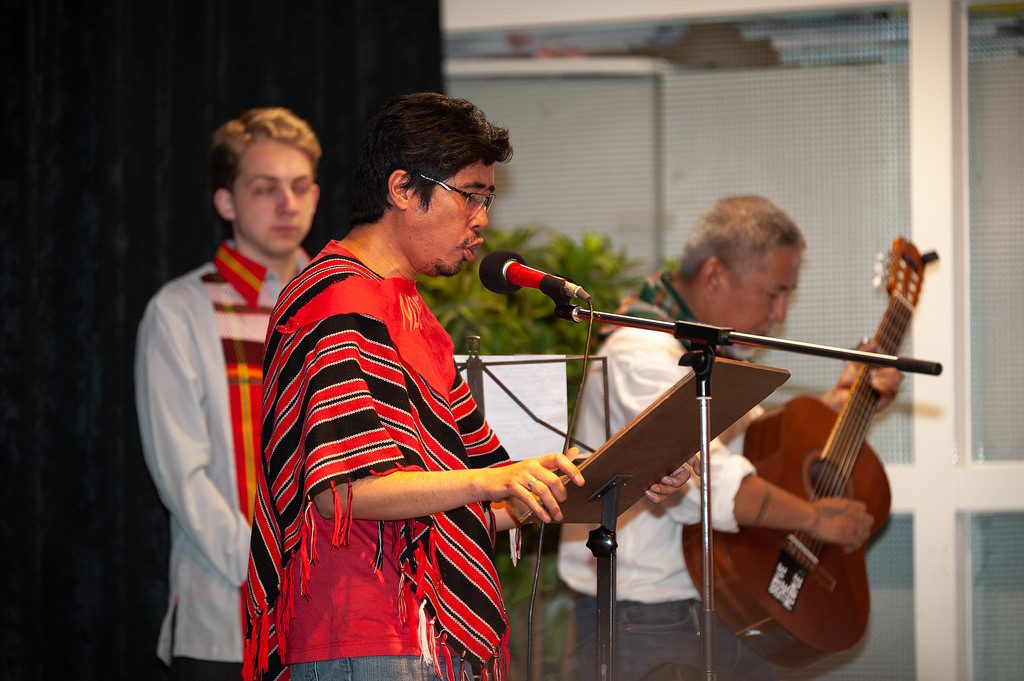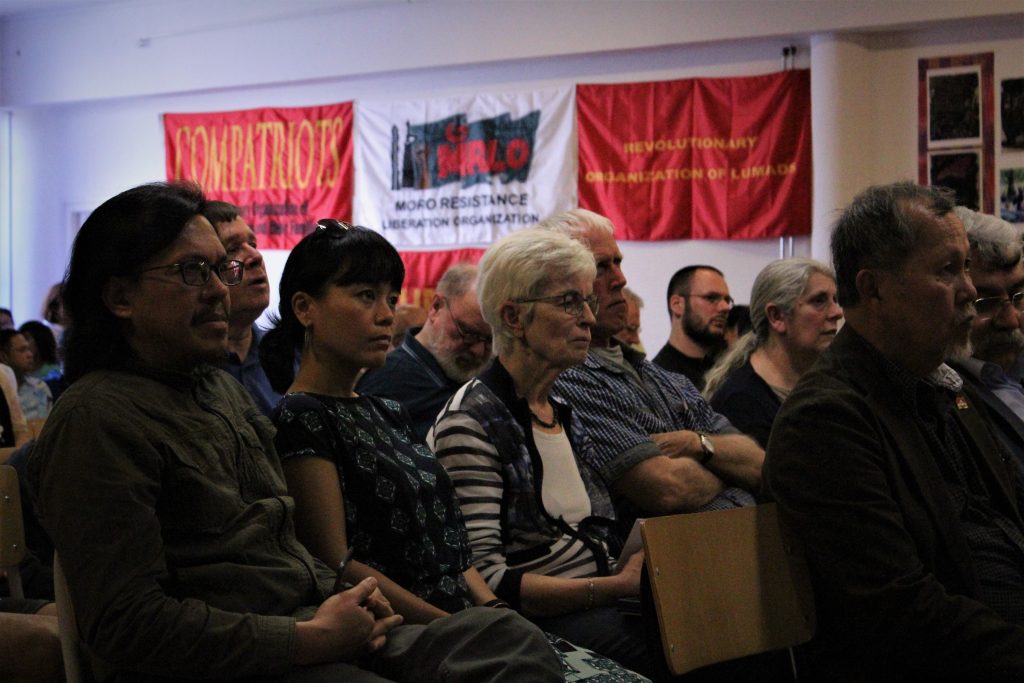
NDFP vows to fight for national freedom, democracy and international solidarity as it celebrates 45th anniversary; honors international friends of the Filipino people
24 April 2018/
Press Release | 22 April 2018
The National Democratic Front of the Philippines (NDFP) vowed to persevere until victory in the fight for the people’s rights and welfare, national freedom and democracy as it celebrated its 45th year anniversary on April 24.
The NDFP International Information Office (NDFPIO) led in the celebrations in Europe as it gathered more than 100 European friends, solidarity activists, Filipino supporters and allies and dozens of organizations, in a joyous celebration under the theme: ¨Build the Broadest United Front to Strengthen the Organs of Political Power and the People´s Democratic Government (PDR), last April 21, 2018 at the Ru Pare Complex in Amsterdam, The Netherlands.
Opening the cultural program as emcees, Marikit Saturay of Anakbayan-Europe, and Thomas van Beersum of Revolutionary Eenheid (Revolutionary Unity) of the Netherlands echoed the NDFP’s vow to proceed until victory, by welcoming the guests with a militant flag performance by young cultural artists and activists from Belgium and The Netherlands.
After the opening performance the audience applauded vigorously as the photos of the NDFP’s recent martyrs were shown, remarkably young revolutionaries involved in the various work of the revolutionary movement – as New People’s Army guerrillas, peasant and women organizers, Lumad and Moro organizers – most of them young women guerrillas and peasant organizers.
In his speech, Prof. Jose Ma. Sison, NDFP chief political consultant in peace negotiations with the Philippine government, and one of the leading founders of the NDFP when it was formed on April 24, 1973 in Baguio City, related how the NDFP has helped to build the local organs of political power at the barangay, municipal or city, district and provincial levels in 73 of the 81 provinces of the Philippines to constitute the people´s democratic government.
The organs of political power, Sison explained, are the political structures and formations that serve as weapons to defend the people and communities against oppressive landlords, big business plunderers and landgrabbers, and the fascist military.
Sison stated that in the process of building the united front for revolutionary armed struggle, the NDFP has engaged in activities and campaigns to promote and realize full national sovereignty, democracy, social justice, economic development through land reform and national industrialization, cultural progress, peace and harmony among the people and international solidarity.
He said the NDFP has always been open and serious in forging national unity including alliance with the anti-Duterte political opposition to effect regime change if the Duterte regime continues to be adamant in opposing the national and democratic rights of the people.
Professor Sison stressed that the need for peace negotiations has become even more pressing in the face of the worsening economic crisis and imperialist exploitation and plunder of the Philippines, and that the broadest unity is vital to defend national democracy and justice.
Focusing on the achievements of the international solidarity work of the NDFP, Luis Jalandoni, chief international representative of the NDFP and senior adviser to the NDFP peace negotiating panel, related how the NDFP began its international solidarity work abroad and how the Filipino people’s struggle for national freedom and democracy drew immediate international support with the successful convening of the International People’s Tribunal in Belgium in 1980, organized by European friends of the NDFP. The IPT, Jalandoni stressed, declared the US-Marcos regime unfit to govern and the NDFP as the genuine representative of the Filipino people.
Since then, Jalandoni said, the NDFP has forged warm and friendly relations with revolutionary and militant organizations, among them, in East Timor, Mozambique, the African National Congress in South Africa, the Palestine Liberation Organization (PLO) of Arafat, Zimbabwe, Cuba, the Sandinistas of Nicaragua, India, Indonesia, Australia, Japan, Latin America, the United States, Canada, Mexico, and forces and political parties and organizations in Europe, where the NDFP International Office is based.
He stated that during all those 45 years, the NDFP has also forged solidarity relations with many churches, human rights organizations, trade unions, workers organizations, youth and women’s groups and development organizations, including many European parliamentarians and UN-affiliated formations.
Julie de Lima, member of the NDFP peace negotiating panel and chairperson of the Reciprocal Working Committee on Social and Economic Reforms (RWC-SER), which spearheaded in crafting the NDFP draft on the Comprehensive Agreement on Social and Economic Reforms (CASER), underscored that the CASER is the cornerstone for achieving a just and lasting peace in the Philippines, and would be the key to solving the root causes of the armed conflict — poverty, unemployment, backwardness and underdevelopment.
De Lima emphasized, however, that the forging of the CASER has been proven to be the most difficult, since its core of implementing genuine land reform and free distribution of land to the landless, rural development and national industrialization run counter to the interests of big landlords, the compradors and big businesses, who effectively control the political and economic structures in the Philippines, including Philippine Congress.
Duterte, she stressed, is the most blatant in refusing to negotiate and in flouting his US puppetry and unashamedly allowing the plunder of the Philippine’s resources.
A highlight of the celebration was the recognition accorded by the NDFP to several of its international friends. Among the honorees were Tatiana Lucman, an activist and translator from Indonesia, Rainer Werning, a book author and editor from Germany, Jan Fermon, a Belgian lawyer who expertly defended Professor Sison to have him removed from the so-called terrorist list, Dagmar Eberhard, a medical doctor and Mike Forschner, an IT expert, both from Germany, Wim and Annie van Wijk, husband and wife from the Netherlands who have long been in the solidarity movement for the Philippines, Jan Beentjes, an ex-Dutch soldier and translator (posthumous), and Willem Geertman, a Dutch missionary in the Philippines who was killed by military operatives on July 3, 2012 in Pampanga province (posthumous).
Heartwarming songs were rendered by Filipino cultural artist Jefry Guiban from Belgium, who sang “Makiisa, Manindigan” a music composed by Philippine-based composer Karl Ramirez, and Ms. Janine Santos, a music scholar at the Louvain University in Belgium, who serenaded the awardees.
Among the solidarity greetings and messages received by the NDFP were from the Marxist-Leninist Party of Germany, International Committee in Support of the People’s War in India, Red Party of Norway, Kurdistan National Congress, Kurdistan-Philippine Solidarity Organization, Marxist-Leninist Group of Netherlands, Communist Party of Mexico, Workers’ Party of Belgium and the Nepalese Progressive Front-Europe.
Apart from acknowledging the various Filipino migrant organizations and European solidarity groups and friends who were present in the celebration, the NDFP also acknowledged the attendance of Mr. Alvaro Sanchez, charge de’ affaires of the Venezuelan Embassy in the Hague.
Another feature of the celebration was the showing of the video-documentary, “Inside the New People’s Army” produced by the Redfish Media Collective in Berlin, Germany and recently shown on RT Television. It showed that two governments exist in the Philippines – the reactionary regime of Duterte, and the revolutionary movement, led by the Communist Party of the Philippines (CPP) and the NDFP. The film showed how the NPA guerrillas are organizing the people and their communities in Mindanao, Duterte’s homebase, so they can effectively fight big comprador landlords, and landgrabbers, and big businesses plundering and destroying the environment.
The cultural celebration closed with a rousing performance by the young cultural activists and the singing of the “Internationale”.
Guests were later treated with a sumptuous and delicious dinner prepared and donated by Filipino migrant organizations in the Netherlands.###
